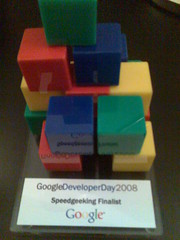I’m a huge fan of FriendFeed.
I think that too many internet pundits see it as competition for Twitter, which is distracting from the real innovations it has provided. FriendFeed is the first real new way of reading rss feeds since the distinction between river-of-news and source-centric emerged.
The addition of a social layer which allows people to define who they are (by what data they produce) makes the subscription process much easier. I could see myself suggesting to family members to sign up to it so they’ll see what I’ve been doing – rather than the alternative of them having to remember to visit Flickr, and my 4 blogs etc, etc, or use a traditional blog reader wich will just confuse them.
At work, we started building a similar service for a vertical market group (educators in Australia) in roughly the same time frame as FriendFeed. There are a number of differences (we’ve only had 1.5 developers working on it over that time, for a start!), but the one thing FriendFeed has which I want is the commenting on items.
We actually built a proof-of-concept for a social-bookmarking service which would allow commentry on posted items (as well as on tags), but that hasn’t been incorparated into our service yet. However, we didn’t think of building that directly into the newsfeed, which is such a small thing, but makes such a difference.
Apart from that, here’s some things which I love about FriendFeed but most people probably don’t think about:
- The way your profile shows who you follow, not who follows you. Showing the number of people who follow you turns it into a popularity contest, which is kind of silly.
- The subtle influence of “Like” by your friends on what shows in your feed. If one of your friends “Likes” something then it will show up in your feed as posted by a friend-of-your-friend.
- The ordering of who liked something by how far away they are from you in the social graph (or showing your friends first, anyway)
- The search. The fact that it is easier to find one of my own del.icio.us posts on FriendFeed than in del.icio.us itself is scary.
- Imaginary Friends is a brilliant idea, which solves a really big problem. Whoever thought of that – in particular the name! – deserves lots of “Like”s
- The “multi-level” nature of it. You can start with using it just as a way of following people, then discover features just as you think “wouldn’t it be great if I could….”
Things I don’t like:
- “Like”. The meaning of the word makes it difficult to use in some circumstances (eg, reading about something bad which you want to remember). In our social bookmarking prototype we used a system very much like the “Rating an Object” pattern from the Yahoo design pattern library (which is a great resource for social software patterns, BTW). I think that actually rating an object may not quite have the correct social connotations for FriendFeed, but perhaps a “Star” (like in GMail) might be appropriate?
- I don’t think FriendFeed rooms work, yet. Maybe it is that I don’t quite get them, but firstly I can’t see a good way to find them, and secondly the fact that items need to be specifically re-shared into them is confusing. (OTOH, I’m probably wrong here, and they are probably already heavily used. We built a similar feature called communities (eg), and they have worked pretty well. We do have a discovery mechanism, though (as well as a more subtle recommendation thing when a person edits their profile)).
- Sometime a friend will share an item, and because people keep commenting it will remain towards the top of my feed for a long time. I know I can hide it, but I’d prefer the reverse – if I don’t “Like” it of comment on it then it should go away quicker.
Feature requests (some of these are things we’ll probably build into our system anyway):
- Tagging. I want to use FriendFeed as a social bookmark system.
- Direct messages, or a “@”-like syntax which will make sure a message is recived by the target.
Anyway, like I said: I’m a big fan. I think FriendFeed is already beautiful software, and it’s a joy to see the subtle, continuous refinement and evolution it goes though.
